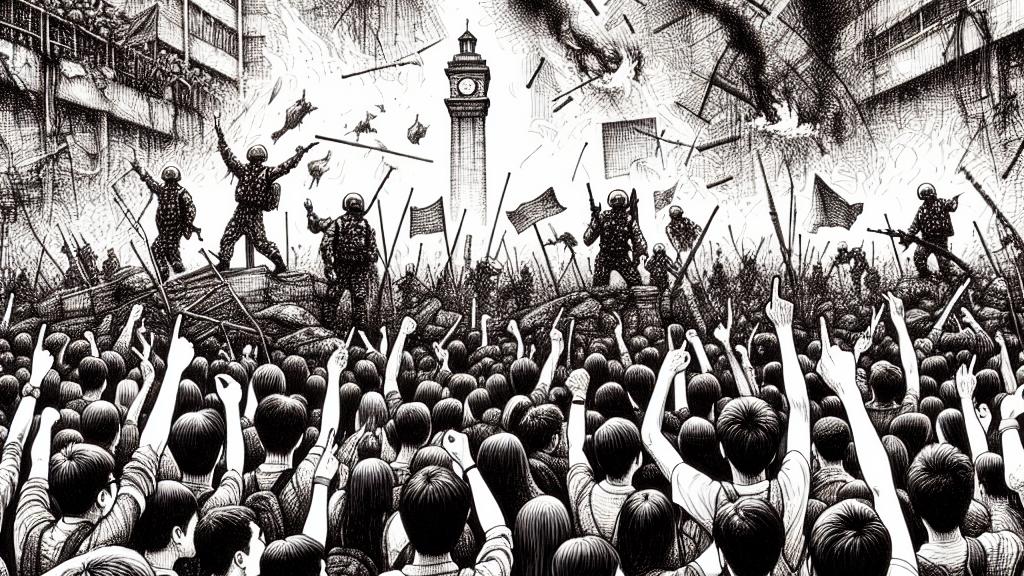Bangladesh Bans Islamic Party Amid Deadly Job Protest Chaos!
Overview
- Bangladesh imposes a ban on Jamaat-e-Islami following violent protests.
- Student-led demonstrations over job reservation policies resulted in numerous fatalities.
- International watchdogs express grave concerns over the government's human rights infractions.

Context of the Protests
In July 2024, Bangladesh witnessed a surge of protests sparked by student opposition to a controversial quota system designed to reserve a proportion of government jobs for specific demographics, particularly relatives of war veterans. The unrest began in universities, quickly spiraling into chaos and resulting in violent clashes with law enforcement in Dhaka. The government’s response to the escalating violence was severe, relying heavily on force to quell dissent, leading to tragic outcomes where reports detailed deaths exceeding 150 individuals. The violent confrontations mark a significant moment of turmoil within the nation, posing a substantial challenge to the ruling Awami League government.
Government's Decision and Reactions
In light of the turmoil, the Bangladeshi government swiftly announced a ban on the Jamaat-e-Islami party, accusing it of inciting violence and disorder during the demonstrations. This ban is set to take effect on July 31, 2024, and has drawn criticism from various corners as being unconstitutional and aimed at repressing dissent. Members of Jamaat-e-Islami condemned the government's actions as unjust, claiming that the ruling party seeks to consolidate power by eliminating opposition voices. The decision also sparked fears among human rights advocates who view the ban as part of a systematic effort by the government to stifle political pluralism and dissent in an increasingly authoritarian climate.
Socioeconomic Underpinnings
The protests over job quotas highlight deeper socio-economic frustrations plaguing Bangladesh, particularly among its youth. High unemployment rates and a lack of substantial job opportunities create a fertile ground for discontent. For many graduates, government jobs represent stability and security, yet the existing quota system is perceived as unfair and discriminatory. Activists are demanding a transition to a merit-based hiring process, arguing that this would promote equitable access to employment, irrespective of one's background. The climate of high inflation only deepens the crisis, exacerbating feelings of disenfranchisement among young people who struggle to find meaningful employment in a challenging economic landscape.
Global Reactions and Human Rights Concerns
The international community has reacted strongly to the Bangladeshi government's violent suppression of protests and the recent ban on Jamaat-e-Islami. Human rights organizations, including the United Nations, have voiced serious concerns regarding the government's methods, urging it to uphold fundamental rights like freedom of assembly and expression. Reports of excessive use of force, internet censorship, and arbitrary detentions have raised red flags; critics argue that such actions violate not only local laws but also international human rights agreements. In light of ongoing violence, calls for independent investigations into governmental actions are mounting, as activists and international observers seek accountability for the tragic events that unfolded.
Looking Ahead: Prospects for Change
As Bangladesh navigates this turbulent period, the future remains uncertain. Student leaders and activists have vowed to continue their push for reforms, advocating for transparency and accountability from the government regarding the violence and its policies. The government's approach to handling this unrest will significantly impact its legitimacy and the potential for future protests. The response from the international community may also play a pivotal role in shaping Bangladesh's trajectory—whether it encourages democratic reforms or emboldens further repression. Ultimately, the developments in the coming months could profoundly influence the political landscape and the youth's role in it within Bangladesh.

Loading...